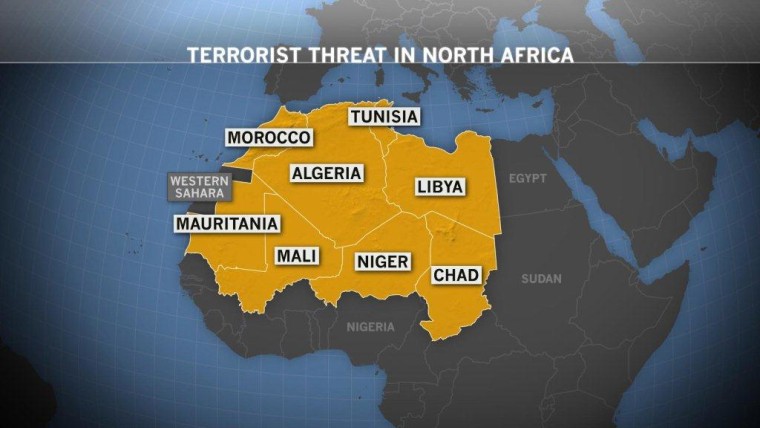The U.S. spent a decade hunting al-Qaida terrorists in the Middle East--but that challenge may soon pale in comparison to the sheer complexity of the task waiting in North Africa, where bands of terrorists and militants have found footholds in half a dozen countries across a region the size of the continental United States. The attack on the U.S. consulate in Benghazi, the bloody kidnapping that killed three dozen foreigners in Algeria and the U.S. decision to support French air strikes in Mali have put the region squarely in the public eye, even if it has been a familiar issue to those tasked with confronting global threats.
"Concerns about terrorism and instability in North Africa are of course not new," outgoing Secretary of State Hillary Clinton told a Senate committee Wednesday. "They have been a top priority for the entire administration's national security team. But we have been facing a rapidly changing threat environment, and we have had to keep working at ways to increase pressure on al-Qaida in the Islamic Maghreb and the other terrorist groups in the region."
The group known as al-Qaida in the Islamic Maghreb (AQIM) has its roots in anti-government forces that fought in Algeria in the 1990s. Aligning itself with al-Qaida extremists, the group expanded gradually, cementing its grip on Algeria and Northern Mali. While those two countries remain at the heart of AQIM's operations, the whole of North Africa can be seen as a fertile environment for their activities. Rampant poverty and high unemployment rates, particularly among Africans under 34, have given militants a pool of potential recruits in need of income. Political instability has wracked several countries, leaving those in power struggling from a lack of resources and rampant criminality inside and outside of government. Governments have been overthrown in Egypt, Libya and Tunisia. Mali and Mauritania have had three military coups between them in the past decade, while ethnic violence plagues Nigeria and Sudan.
Secretary Clinton says al-Qaida's decline in the Middle East has also strengthened its counterparts in North Africa, giving them the benefit of new funding and new recruits that were driven from safe havens in Pakistan and Afghanistan. The Arab Spring shook things up even more. "The Arab revolutions have scrambled power dynamics and shattered security forces across the region", she told Congress on Wednesday.
The fall of Moammar Gadhafi likely marks a tipping point in AQIM's emergence as a global threat. NBC's Chief Foreign Correspondent Richard Engel reported Wednesday that after Gadhafi was killed, "I had never seen so many weapons in my entire life. They were taken from depots, they were being handed over militant groups and then they went all over region." The combination of new recruits, new funding and new weapons present a challenge unlike any the U.S. has previously faced--and one that Secretary Clinton herself warns pose a threat to America.
"People say to me all the time, well, AQIM hasn't attacked the United States," she told a packed house on Capitol Hill. "Well, before 9/11, 2001, we hadn't been attacked on our homeland since, I guess, the War of 1812 and Pearl Harbor. So you can't say, well, because they haven't done something, they're not going to do it."
U.S. Senator Chris Coons, chair of the Senate Foreign Relations Subcommittee on African Affairs, will join Chuck Todd Friday on The Daily Rundown.
